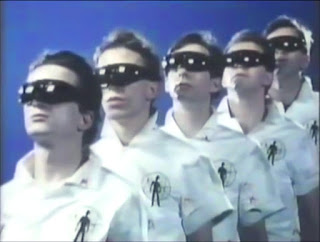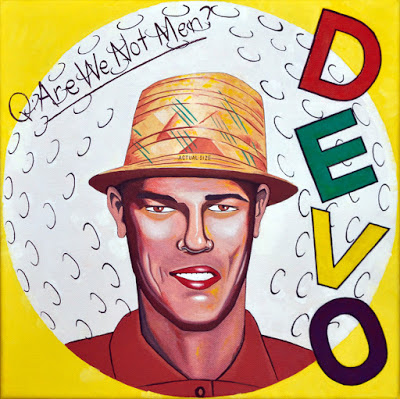What makes DEVO particularly interesting from a national-socialist perspective is the incorporation of Lothrop Stoddard’s theory of the under-man in their songs. Stoddard offered an explanation for why society might be getting worse and worse. In his book, The Revolt Against Civilization: The Menace of the Under-Man (1922), Stoddard argued that civilization was endangered precisely by de-evolution (whence DEVO gets its name). The ease of civilized life made it possible for degenerates and throwbacks to survive and multiply within civilization, and ultimately, when they became too numerous, to destroy the civilization that had enabled them to survive. The Bolshevik takeover in Russia was, in Stoddard’s view, a result of this process. National-Socialist use of the word Untermensch reflects Stoddard’s influence in Germany.
The song chosen for the A-side of DEVO’s first single, “Mongoloid” (1976), portrays the undetected persistence of cognitively impaired genetic defectives within our society:
Mongoloid, he was a mongoloid,
Happier than you and me;
Mongoloid, he was a mongoloid,
And it determined what he could see.And he wore a hat,
And he had a job,
And he brought home the bacon,
So that no one knew.
The only absurdity in the song is the premise that a sufferer of Down’s syndrome (a “mongoloid” in older terminology) could go undetected. This is a comic exaggeration of the real problem that Stoddard identified.
The flipside to “Mongoloid” was “Jocko Homo,” which mocks the perspective of someone who denies evolution — and, by implication, de-evolution. The song’s title is copied from a 1925 anti-evolutionary tract by Christian apologist B.H. Shadduck, Ph.D.
The lyrics alternate between denying and admitting de-evolution. The rhetorical question “Are we not men?” really means: are we not all equal and worthy insofar as we are all classified as “men”? The answer to the question however is: “We are DEVO.” — in other words, products of degeneration. “We’re pinheads all.”
The cover of DEVO’s first album, Q: Are We Not Men? features what used to be known in common parlance as a pinhead (microcephalic individual). If you look carefully, you can see that the misshapen head on the cover is stamped “ACTUAL SIZE.”
Gradual loss of cranial capacity within White populations was an early concern of racial hygienists. Once again, DEVO presents the problem in an exaggerated form. The representation of a man with a tiny cranium wearing a polo-shirt and a fedora implies, again as in the case of the “Mongoloid,” that this seriously defective individual is passing for normal and achieving some degree of social success — and seriously threatening the whole population and social structure through an insidious infiltration of hereditary unintelligence.
The spectacle of mentally deficient people prospering and multiplying was likely part of DEVO’s firsthand experience from living in an industrial town like Akron, where, typically, there are simple and repetitive factory-jobs that allow even a moron to prosper, if he is only reliable and obedient. This is not to say that everyone who does such work is a moron, but a moron can be successful in these niches — with disastrous longterm consequences for the general population. That is what the A and B-sides of DEVO’s first single, and the cover of their first album, represent.
DEVO was sometimes described as the band that showed that “fascism” could be fun, which probably meant that Jews caught the references in DEVO’s lyrics but managed to convince themselves that the band could not possibly have been serious.
Now, if DEVO had been clearly serious about all this, they could not have had much of a career. They would not have been allowed their crucial appearance on Saturday Night Live in 1978, and other important breaks.
Gerald Casale, DEVO’s keyboardist, said that DEVO deliberately went against the currently prevailing cultural norms:
“We were doing something that looked wrong, sounded wrong, and we talked about things that no one was talking about.”
From that explanation, one might suppose that writing songs about the effect of dysgenic breeding was just for shock or novelty. If DEVO wanted to say something antithetical to the dominant trends of the 1970s, they picked the right thing, and even if they did not really mean it, nonetheless, as Chaucer said: “Many a true word is spoken in jest.”
After the beginning of commercial success, the theme of de-evolution seems to have receded from its early prominence in DEVO’s work.
The song “Beautiful World” (1981) is quite good and has some fine ironic lyrics about how the world is not progressing but deteriorating. That in itself is already an anti-leftist attitude. The song also calls attention to conflicting interests:
It’s a beautiful world for you, for you,
Not for me.
The assumption that conflict is inherent in life is fundamental to nationalism and antithetical to globalism. The conflict here is between a high-quality population with high standards (represented by the singer in his quasi-fascist uniform) and low-quality populations with low standards (to whom the song might be addressed).
The song’s official video begins with genuine images of beauty from nature, followed by images of a beautiful, futuristic White world — but then a decline into ugliness begins. The first hint of the decline into ugliness is the scattered appearance of some non-White faces followed by lewd dancing — but different people will interpret this different ways. The decline into ugliness becomes unambiguous, however, with a scene of a German soldier (from the First World War) lobbing a grenade, as if the appearance of some non-White persons had caused Whites themselves to descend into savagery (an interpretation consistent with some statements of C.G. Jung), but again, not everyone will make that interpretation. It seems that the meaning of the video was deliberately left ambiguous.
After the descent into ugliness has clearly begun, we see among other things, a stereotypical image of a bawling African Negro child. We are allowed to think that what’s really wrong with the world is man’s inhumanity to man, including the fact that poor little African children are allowed to starve. This is hackneyed claptrap for leftists, and a contradiction of DEVO’s fundamental message.
What is really wrong with the world, of course, is that somebody not only fed that African Negro child without preventing his further multiplication, but even enabled him to immigrate to the White world, destroying the possibilities for a White future such as that shown at the beginning of the video. We, as White people, are not going to be able to preserve ourselves with this kind of indiscriminate generosity.
What I propose is that someone with some video-editing chops make an updated version of DEVO’s “Beautiful World” video. First, choose a different scene for the transition into ugliness. Instead of a German soldier, show some significant anti-White event. Cut out the starving African child and the absurd footage that conveys absolutely nothing, and put in scenes of non-White violence, some Black Lives Matter, and scenes of non-White immigration, with applauding and rejoicing Obamas, Hillaries, and Merkels, and Jewish fatcats. I recommend using clips from something like this footage of naive little 14-year-old Haydyn Wilson being attacked by five Negroes in, of all places, Australia:
See, it’s a “beautiful world” for these Negroes, since they are enjoying the benefits of White civilization, but not for Haydyn Wilson, who has to endure their presence.
Colin Flaherty I think has tons of this stuff, but it’s important to get in the Jewish and White-traitor angle too. It’s a beautiful world for them.
That would clarify in DEVO’s “Beautiful World” what may have been its originally intended meaning, which commercial considerations did not allow to be clearly expressed.

